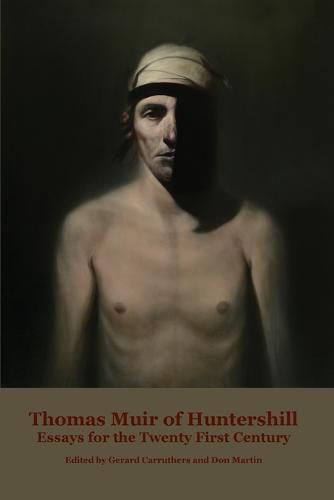Readings Newsletter
Become a Readings Member to make your shopping experience even easier.
Sign in or sign up for free!
You’re not far away from qualifying for FREE standard shipping within Australia
You’ve qualified for FREE standard shipping within Australia
The cart is loading…






This title is printed to order. This book may have been self-published. If so, we cannot guarantee the quality of the content. In the main most books will have gone through the editing process however some may not. We therefore suggest that you be aware of this before ordering this book. If in doubt check either the author or publisher’s details as we are unable to accept any returns unless they are faulty. Please contact us if you have any questions.
Those researching the history of political democracy in Scotland will inevitably find that one name stands out from the crowd, namely that of Thomas Muir of Huntershill. He was one of several people tried in Scottish courts during the 1790s for the alleged crime of ‘Sedition’, and four of the others share commemoration with him on a large monument in Edinburgh, but somehow Muir seems special. The way he used his trial as a platform to promote the logic of ‘an equal representation of the People in the House of the People’ was extremely dramatic and was fully reported at the time both in newspapers and in several published editions of the trial proceedings. Yet somehow historians have never been fully convinced about Muir’s claim to recognition. For some he represents a sour note in the triumphant story of the Scottish Enlightenment, while others have dismissed him as a failure in his own time, conceding little consequence to the example he set for future generations. Over the years there have been attempts to right what many people regard as a grievous wrong, in this respect. This substantial and insightful edited volume adds to the debate the views of Rhona Brown, Gerard Carruthers, Tom Devine, Tom Dowds, Satinder Kaur, Thomas Lemoine, David McVey, Don Martin, Gordon Pentland, Alex Salmond, Beverley Sherry, Alex Watson, Jimmy Watson, and Ronnie Young.
$9.00 standard shipping within Australia
FREE standard shipping within Australia for orders over $100.00
Express & International shipping calculated at checkout
This title is printed to order. This book may have been self-published. If so, we cannot guarantee the quality of the content. In the main most books will have gone through the editing process however some may not. We therefore suggest that you be aware of this before ordering this book. If in doubt check either the author or publisher’s details as we are unable to accept any returns unless they are faulty. Please contact us if you have any questions.
Those researching the history of political democracy in Scotland will inevitably find that one name stands out from the crowd, namely that of Thomas Muir of Huntershill. He was one of several people tried in Scottish courts during the 1790s for the alleged crime of ‘Sedition’, and four of the others share commemoration with him on a large monument in Edinburgh, but somehow Muir seems special. The way he used his trial as a platform to promote the logic of ‘an equal representation of the People in the House of the People’ was extremely dramatic and was fully reported at the time both in newspapers and in several published editions of the trial proceedings. Yet somehow historians have never been fully convinced about Muir’s claim to recognition. For some he represents a sour note in the triumphant story of the Scottish Enlightenment, while others have dismissed him as a failure in his own time, conceding little consequence to the example he set for future generations. Over the years there have been attempts to right what many people regard as a grievous wrong, in this respect. This substantial and insightful edited volume adds to the debate the views of Rhona Brown, Gerard Carruthers, Tom Devine, Tom Dowds, Satinder Kaur, Thomas Lemoine, David McVey, Don Martin, Gordon Pentland, Alex Salmond, Beverley Sherry, Alex Watson, Jimmy Watson, and Ronnie Young.